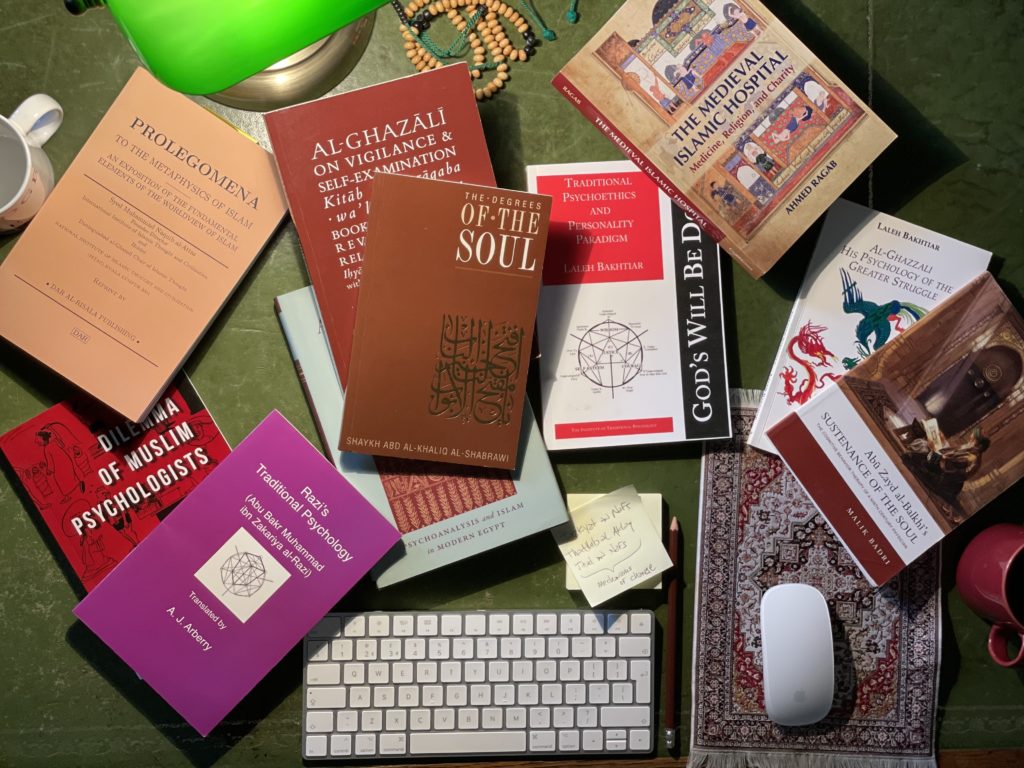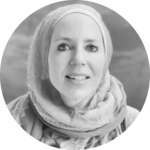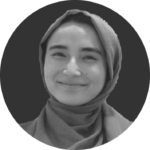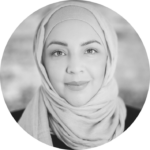
ABOUT THE LAB
What we do:
Our research investigates the principles of Islamic psychology (IP) and their application in therapeutic and clinical practice. We develop foundational and theoretical frameworks of Islamic psychology and explore their application within therapeutic approaches, practices of human development, and wellbeing.
Why we do it:
The IP Laboratory’s research aims to increase the understanding of the spiritual phenomena involved in psychological processes and mechanisms of change. Our approach focuses on the spiritual state of the heart and how that impacts optimal holistic health, including the transformation of psychological imbalances. The CMC IP Lab focuses on the heart as the locus of human development rather than the brain, cognition, or behaviour.
How we do it:
While we ground our understandings of human psychology in an interdisciplinary study of the traditions of Islamic thought and embodied practice, our focus is on the practical translation of the Islamic Tradition’s concepts and principles into embodied therapeutic application. Thus our methodological approach is interdisciplinary and practically-oriented. To this end, we are exploring the still undeveloped possibility of experimental Islamic psychology. This will enable us to develop a robust evidence-based body of research to demonstrate the efficacy of Islamically grounded, heart-centered, spiritually integrated therapeutic and developmental applications.
CURRENT PROJECTS
- Research to Understand the Heart in Islamic Psychology (RUH-IP)
- Exploring Young Muslims’ Holistic Development within an Islamic Theory of Human Development
- The development of measurement tools for examining clinical application of Islamic Psychology conceptual frameworks
- States of the Heart: A review of methods and assessments in understanding dimensions of the self in Islamic Psychology.
COLLABORATIONS
Stanford Muslim Mental Health Lab:
Communication around ongoing research projects and possible syncing of themes. For example, using current text-based research and translation from Stanford projects to inform our experimental studies.
Sharing of clinical data and experience to inform the lab’s direction of topics based on current trends. Feeding back into clinical case studies via KC’s clinicians.
International Association of Islamic Psychology (IAIP):
Cooperation in development of standards of practice in the field of Islamic Psychology. Communication about important and relevant research and providing of impact data.
PEOPLE
Lab Director
Abdallah Rothman

Dr Abdallah Rothman is the Principal of Cambridge Muslim College and holds an MA in Psychology from Antioch University and a PhD in Psychology from Kingston University London. His clinical practice as well as his academic research focus on approaching counselling and psychotherapy from within an Islamic paradigm and establishing an indigenous Islamic theoretical orientation to human psychology that is grounded in the knowledge of the soul from the Islamic tradition. In addition to his academic training he has studied privately with a number of traditional Islamic scholars throughout the Muslim world. Dr Abdallah is visiting professor of psychology at Zaim University Istanbul, International Islamic University Islamabad, and Al-Neelain University Khartoum and co-founder, along with Professor Malik Badri, of the International Association of Islamic Psychology. Learn more about our Principal here.
Post-Doctoral/Visiting Fellows
[Recruited as CMC Fellows, working in or with the IP Lab]
Claire Alkouatli

Dr. Claire Alkouatli holds a PhD in Human Development, Learning, and Culture from the University of British Columbia, Canada, with a methodological specialization, whereby she studied Muslim–Canadian educators’ pedagogies in teaching Islam. Claire is an educational consultant and a lecturer at the University of South Australia’s Center for Islamic Thought and Education. Recent projects include leading a multi-site design experiment on imaginative play and Seera storytelling, inquiring into female leadership in Islamic schools in Australia and New Zealand, and studying wellbeing amongst Saudi women academic leaders. Claire’s research at CMC revolves around conceptions of human development across the human lifespan, asking: what does holistic self, social, and spiritual development look like within an Islamic worldview? What are its premises, principles, and leading activities as mechanisms of transformation? How do adults help foster youth development in different Muslim cultural contexts? How do Muslim youth want to be supported towards thriving? With focus on culture, social relationships, and pedagogies, Claire’s research explores imagination, dialogue, reflection, inquiry, challenge, risk, and adventure in teaching, learning, and developing.
Lab Members
Zulkayda Mamat

Zulkayda Mamat is a Cognitive Neuroscience PhD student at University of Cambridge, and is a graduate of the first cohort from the Islamic Psychology programme at Cambridge Muslim College. She received her undergraduate degree in Biological Engineering from Massachusetts Institute of Technology. She has spent over seven years conducting research in projects across psychology, neuroscience and engineering fields, with her most recent focus investigating the interaction between forgetting and mental wellbeing. She is also engaged in building a non-profit organization that aims to sustainably make psychological care services more accessible and affordable for the Uyghur diaspora community.
Imran Khan

Imran Khan is a member of the Islamic Psychology (IP) lab at the CMC, and a researcher at Queen Mary University of London. He manages a study looking to improve the quality of life for people living with cancer using a talking therapy. Imran is interested in spiritual integrations of such therapies to benefit UK Muslim communities on a wider scale. His work at the IP lab is to understand capturing benefits of an indigenous Islamic psychology. Imran is a member of the Clinical Ethics Committee at Luton & Dunstable Hospital and a board member to the Ihsan Institute for Islamic Studies, UK.
Shaystah Dean

Dr Shaystah Dean is a Clinical Psychologist and Research Fellow based in Wellington, New Zealand. She qualified as a clinical psychologist from The University of Canterbury, and obtained her PhD from the University of Otago Wellington School of Medicine. More recently she completed the Postgraduate Diploma in Islamic Psychology through Cambridge Muslim College. With a background in general and adolescent mental health, in both the public and private sectors, she has research interests in integrated psychological intervention and Islamic Psychology.
PUBLICATIONS
Running list of selected publications produced by members of the lab.
Rothman, A., Ahmed, A., & Awaad, R. (2022). The Contributions and Impact of Malik Badri: Father of Modern Islamic Psychology. American Journal of Islam and Society, 39(1-2), 190–213.
Rothman, A., & Coyle, A. (2021). The clinical scope of Islamic psychotherapy: A grounded theory study. Spirituality in Clinical Practice.
Rothman, A. (2021). Developing a Model of Islamic Psychology and Psychotherapy: Islamic theology and contemporary understandings of psychology. London: Routledge.
Haque, A. & Rothman, A. (Eds.) (2021). Islamic Psychology Around the Globe. Seattle: International Association of Islamic Psychology.
Rothman, A. & Haque, A. (2021). Introduction to Islamic Psychology Around the Globe. In Haque, A. & Rothman, A. (Eds.), Islamic Psychology Around the Globe (pp. 1-23). Seattle: International Association of Islamic Psychology.
Rothman, A., & Coyle, A. (2020). Conceptualizing an Islamic psychotherapy: A grounded theory study. Spirituality in Clinical Practice, 7(3), 197–213.
Khan, F., Keshavarzi, H. & Rothman, A. (2020). The Role of the TIIP Therapist. In Keshavarzi, H., Awaad, R., & Khan, F. (Eds.), Applying Islamic Principles to Clinical Mental Health Care. London: Routledge.
Rothman, A. (2018). An Islamic Theoretical Orientation to Psychotherapy. In York, C. (Ed.), Islamically Integrated Psychotherapy: Uniting faith and professional practice (pp. 25-56). West Conshohocken, PA: Templeton Press.
Rothman, A. & Coyle, A. (2018). Toward a framework for Islamic psychology and psychotherapy: An Islamic model of the soul. Journal of Religion and Health. 57(5), 1731-1744.
Haque, A., Khan, F., Keshavarzi, H., & Rothman, A. E. (2016). Integrating Islamic Traditions in Modern Psychology: Research Trends in Last Ten Years. Journal of Muslim Mental Health, 10(1).

OTHER LANGUAGES

